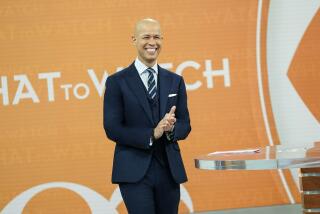Christiane Amanpour, new in town
- Share via
Reporting from Washington — Anyone wondering how Christiane Amanpour, novice to Washington, is going to make it in this “town” (as insiders call the nation’s capital), can rest assured. If her first days on the job here are an indication, she’s as well known on Pennsylvania Avenue as she is in the darkest corners of the world where she’s spent the last two decades reporting for CNN.
On Tuesday, her second day working in Washington for ABC News, where she debuts Sunday as anchor of “This Week,” Amanpour went to hear U.S. Education Secretary Arne Duncan deliver a luncheon speech. Her intention was to get close enough to invite him on her new show.
She ended up being invited to sit on the dais — next to President Obama’s domestic policy advisor Melody C. Barnes. And, after the speech, there were as many people angling to shake Amanpour’s hand as there were to introduce themselves to the speaker. She also had cabs nearly colliding on Pennsylvania to get her fare. After she got in one, she mentioned to the Haitian driver she’d been in his homeland after the earthquake.
“Oh,” he said, eyeing her through the rear-view mirror, “I remember.”
An hour before lunch, Amanpour had seemed a little at sea in her new empty office. She even admitted experiencing a touch of new-job jitters.
But after Duncan’s speech, she was fired up. For what Amanpour heard were themes for her new show: not the traditional insider game of Sunday morning political ping-pong but the gritty application of policy, and how it turns into action and affects people light years removed from Washington. Although others came away from Duncan’s speech reporting on the politics of funding education reform, Amanpour zeroed in on how American kids must learn enough to compete globally.
Getting Americans to care about the world has been a personal mission — and central to the Amanpour brand. (As of Sunday, “This Week’s” title graphics will include a vibrant red, spinning globe.) It remains to be seen whether her international focus will engage the political junkies who wake up Sunday mornings hungry for the latest Washington buzz.
Ian Cameron, the executive producer, is confident Amanpour can broaden the show without sacrificing its tradition. “We’re not wiping the slate clean,” he said. “We have a loyal audience. But we brought in an admired anchor to do things a little bit differently.”
In the 63 years since a Washington-based producer named Martha Rountree moderated the first Sunday morning political gabfest, NBC’s “Meet the Press,” there hasn’t been anyone quite like Amanpour anchoring that hour.
Not only is she not “of” Washington, Amanpour is also not seasoned at quarterbacking an hour of live television with a field of all-stars.
“I’m not touting being an outsider,” she said, “but I’m certainly not pretending I’m not.”
She has no plans to relocate with her husband, James P. Rubin, a former State Department official, and her son from New York to Washington, which only feeds the pond of schadenfreude she’s plunged into. (Inside ABC’s newsrooms, still reeling from cutbacks this spring, there is even speculation the network may move the show to its New York headquarters to save money.)
Over the years many moderators recast the Sunday format to make it their own. ABC’s David Brinkley pioneered the role of the avuncular ring leader of a discussion group; NBC’s Tim Russert became the dominant interviewer and turned “Meet the Press” into the top show; CBS’s tenacious Lesley Stahl pulled off simultaneously covering the White House and anchoring “Face the Nation.”
Stahl, who is now at “ 60 Minutes,” said there is only so much tinkering to be done: “I can’t tell you how quickly we discovered — through ratings — that you better be on the big story of that week if you want the audience that tunes in on Sunday morning to stay tuned to you.”
Although it’s no secret Sunday public affair shows don’t command a huge viewership, a stable core of about 9 million people, considered influential, still tunes in.
For the premiere show, Amanpour set up an interview with House Speaker Nancy Pelosi. But after thousands of classified reports about Afghanistan were leaked this week, a second exclusive interview with Defense Secretary Robert M. Gates was added.
Amanpour is likely to have an easier time reeling in big interviews than she will reframing her breaking-news approach to fit the role of anchor. She said if she hadn’t spent the eight months before she left CNN in April anchoring an eponymous-named daily show, “I would have found this a lot more nerve-wracking.”
Politico’s editor John Harris said Amanpour’s large personality and experience covering abuses of power around the world should serve her well in Washington. “The key to a good show is determining what someone hasn’t been asked yet,” Harris said. “That demands journalistic smarts and doggedness more than it demands a long apprenticeship on a bus cruising around New Hampshire and Iowa.”
Career path
At, 52, Amanpour has spent most of her life outside of the United States.
Born to a British mother and Iranian father, she was raised in privilege in both places. But after the Islamic revolution, her family stopped returning to Iran, and, at age 20, Amanpour found herself looking for direction. It was then she first came to live in America to attend the University of Rhode Island.
After graduating in 1983, Amanpour made her way to Atlanta to work for the then-fledgling CNN. Jeanne Moos, a CNN veteran, remembered meeting her when she was but a junior writer who’d paid for her own way to attend the 1984 Democratic Convention in San Francisco in exchange for CNN getting her a floor pass.
“Even then you could tell she wasn’t going to stay anyone’s assistant for too long,” said Moos, now a video columnist based in New York. “I saw ambition and smarts and go-getter qualities.”
And more than a touch of star power. After convention hours, Moos said Amanpour invited her along to go dancing and play pool with “a college friend and his family.” The friend turned out to be the late John F. Kennedy Jr. and the First Democratic Family.
Moos often teased Amanpour that she’d never make it in television in this country because of her British accent — another sore point with Washington insiders who privately wonder when she talks about the Tea Party in the lead-up to the interim elections this fall if some viewers won’t assume she’s just come from one.
But Moos dared anyone to underestimate Amanpour: “She didn’t just make it in television. She became the most famous correspondent in the world.”
Amanpour’s career skyrocketed during the first Gulf War when the world was glued to CNN and she had a reliable spot doing stand-ups from the roof of the Dhahran International Hotel in Saudi Arabia. From then on her forte became covering war, terror, disease, disaster, and human rights violations. From Bosnia and Kosovo, her reports uncovered atrocities and argued for U.S. military intervention. At times she was criticized for setting a tone better suited to the partisan head of an NGO than a chief foreign correspondent.
Amanpour’s admirers point to all her reporting awards and honors — enough to plaster the walls of her ABC offices in Washington and New York — as evidence of her ability to drill down fairly on any story.
At Tuesday’s lunch, Karen Billings, an education software company executive who spotted Amanpour on the dais, said she was looking forward to watching her Sunday mornings but admitted it would be difficult getting used to her in a pantsuit “sitting behind a desk.
“Mostly,” said Billings, 63, “I picture Christiane Amanpour wearing all that gear with bombs going off behind her.”
“I asked if I could wear my safari suit,” Amanpour said with self-mocking. “I’m not sure that it’s going to fly.”
More to Read
The complete guide to home viewing
Get Screen Gab for everything about the TV shows and streaming movies everyone’s talking about.
You may occasionally receive promotional content from the Los Angeles Times.






